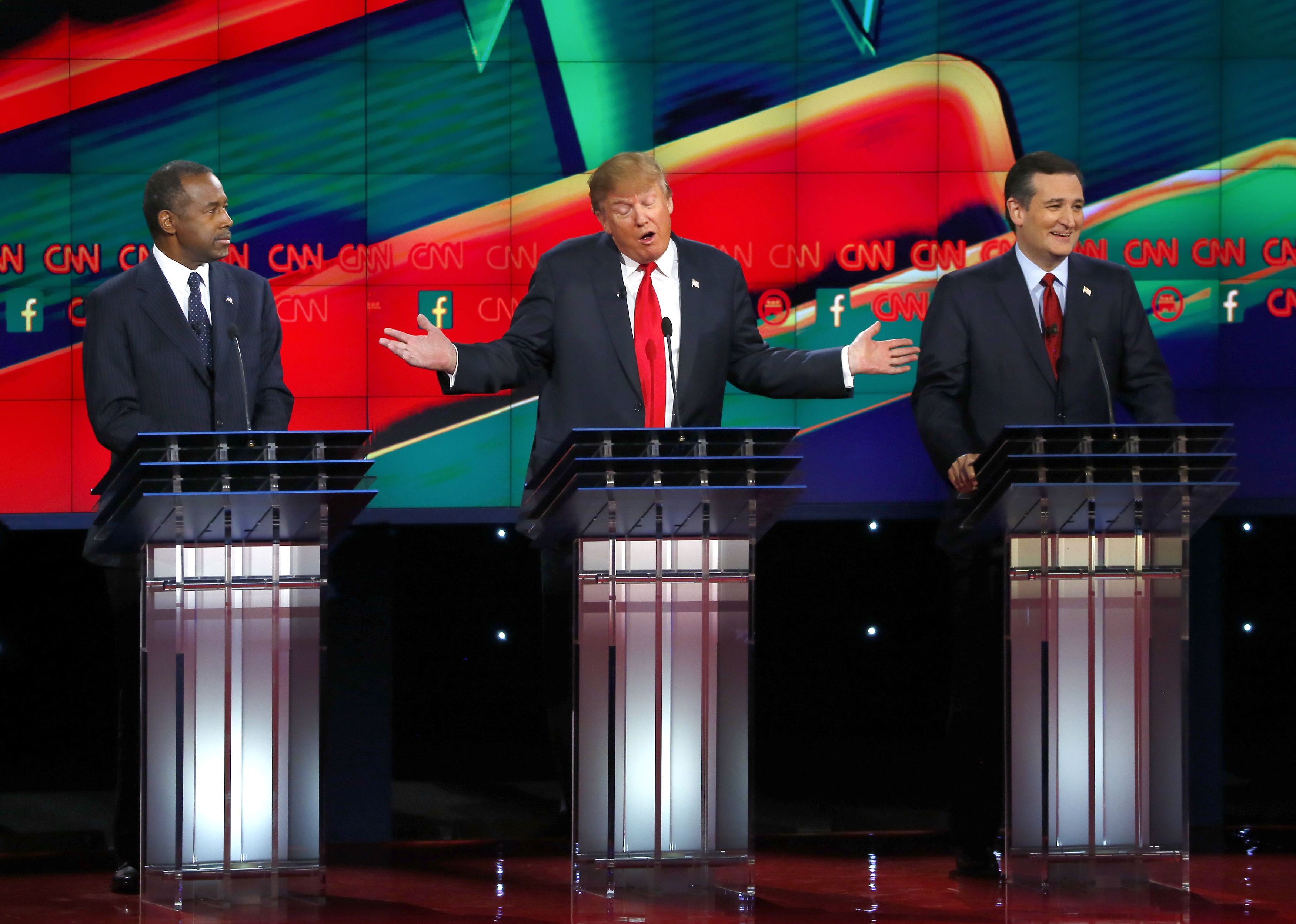The missing middle in the GOP's foreign policy debate
All the American people wanted to hear was a coherent strategy to restore American power. They didn't get it.


Donald Trump might have won last night's Republican debate by default. And the only reason is that the other presidential contenders completely failed to fill the GOP's missing middle on foreign policy and national security.
Those issues don't mean the same thing as they did during the last presidential election. This is why Mitt Romney has felt largely vindicated on international matters, but only in a way that feels vaguely beside the point. It's not just war and diplomacy any more: Counterterrorism and traditional war, security and surveillance, and immigration and guns are now a single political entity oozing across the campaign trail.
And the only candidate to capitalize on it is Donald Trump, whose seemingly catchall xenophobia is actually a stalling tactic, a mask for complete ignorance about how to restore a U.S.-led global order that instills basic confidence in a supermajority of Americans.
The Week
Escape your echo chamber. Get the facts behind the news, plus analysis from multiple perspectives.

Sign up for The Week's Free Newsletters
From our morning news briefing to a weekly Good News Newsletter, get the best of The Week delivered directly to your inbox.
From our morning news briefing to a weekly Good News Newsletter, get the best of The Week delivered directly to your inbox.
It's not that candidates aren't trying. Ted Cruz and Marco Rubio spent much of last night contrasting each other's security credentials. But Rubio, trying to make Cruz look weak, stayed too Orwellian on surveillance, while Cruz, casting Rubio as a junior varsity neocon, stayed too Jacksonian on bombing campaigns.
In the void where the Republican middle should be, a candidate would push for a lighter touch than Rubio's at home and a heavier one than Cruz's abroad. Instead we have: Rand Paul clamoring for lightness on both ends, claiming that debt — debt — poses the greatest threat to our national security; Lindsey Graham pining for the days of Total Information Awareness at home and invasion abroad; Chris Christie speaking with clarity and confidence about a domestic crackdown; and Jeb Bush terminally unable to get out from under Trump's bitter denunciations of his brother's invasion of Iraq.
In the GOP's absent middle, a candidate would match the poise and authenticity of Graham or Christie with the suspicion of unchecked power conveyed by Cruz or Paul. Where now an embarrassed silence has fallen, a candidate would extend Carly Fiorina's critique of the political class to the realm of grand strategy, offering neither ideological caricature nor grab-bag bluster.
What has befallen the poor GOP? At least three sharp disadvantages have conspired to gut the party's midsection.
A free daily email with the biggest news stories of the day – and the best features from TheWeek.com
First, there are just too many candidates in play. Far too many onstage last night couldn't say a word about foreign policy or national security without telegraphing, calibrating, positioning, massaging, or otherwise puffing themselves up. Any sort of unified, intelligent strategy was lost among these personality-driven performances. Cutting down on candidates will not zap away this problem, but it would help.
Alas there's not much to be done about Republicans' second big problem: their rivals across the aisle. The Democrats now belong to a party where monied power will be flattered and praised so long as its elite representatives flatter and praise the right social issues. Insurgents against the corporatist power elite, such as Bernie Sanders, realize they lack the luxury of wasting precious words or screen time on foreign policy. Having disavowed an adult reckoning with America's role in the world, Democrats are free to ridicule Republicans without offering a coherent vision of their own.
Worst of all, however, is the American people themselves. The fact is that no candidate's military approach to the Islamic State sounded great last night because no approach is good enough for public opinion today. Doing nothing is an insult; redoing Iraq is an outrage. Carpet bombing perpetrates heartless barbarism; kill teams perpetrate dirty wars. Deposing Assad is Rumsfeldian, but keeping him is Kissingerian.
We the people want the impossible. We demand the absurd. No wonder Trump's hollow decoupage draws such applause.
James Poulos is a contributing editor at National Affairs and the author of The Art of Being Free, out January 17 from St. Martin's Press. He has written on freedom and the politics of the future for publications ranging from The Federalist to Foreign Policy and from Good to Vice. He fronts the band Night Years in Los Angeles, where he lives with his son.
-
 Zimbabwe’s driving crisis
Zimbabwe’s driving crisisUnder the Radar Southern African nation is experiencing a ‘public health disaster’ with one of the highest road fatality rates in the world
-
 The Mint’s 250th anniversary coins face a whitewashing controversy
The Mint’s 250th anniversary coins face a whitewashing controversyThe Explainer The designs omitted several notable moments for civil rights and women’s rights
-
 ‘If regulators nix the rail merger, supply chain inefficiency will persist’
‘If regulators nix the rail merger, supply chain inefficiency will persist’Instant Opinion Opinion, comment and editorials of the day
-
 Bari Weiss’ ‘60 Minutes’ scandal is about more than one report
Bari Weiss’ ‘60 Minutes’ scandal is about more than one reportIN THE SPOTLIGHT By blocking an approved segment on a controversial prison holding US deportees in El Salvador, the editor-in-chief of CBS News has become the main story
-
 Has Zohran Mamdani shown the Democrats how to win again?
Has Zohran Mamdani shown the Democrats how to win again?Today’s Big Question New York City mayoral election touted as victory for left-wing populists but moderate centrist wins elsewhere present more complex path for Democratic Party
-
 Millions turn out for anti-Trump ‘No Kings’ rallies
Millions turn out for anti-Trump ‘No Kings’ ralliesSpeed Read An estimated 7 million people participated, 2 million more than at the first ‘No Kings’ protest in June
-
 Ghislaine Maxwell: angling for a Trump pardon
Ghislaine Maxwell: angling for a Trump pardonTalking Point Convicted sex trafficker's testimony could shed new light on president's links to Jeffrey Epstein
-
 The last words and final moments of 40 presidents
The last words and final moments of 40 presidentsThe Explainer Some are eloquent quotes worthy of the holders of the highest office in the nation, and others... aren't
-
 The JFK files: the truth at last?
The JFK files: the truth at last?In The Spotlight More than 64,000 previously classified documents relating the 1963 assassination of John F. Kennedy have been released by the Trump administration
-
 'Seriously, not literally': how should the world take Donald Trump?
'Seriously, not literally': how should the world take Donald Trump?Today's big question White House rhetoric and reality look likely to become increasingly blurred
-
 Will Trump's 'madman' strategy pay off?
Will Trump's 'madman' strategy pay off?Today's Big Question Incoming US president likes to seem unpredictable but, this time round, world leaders could be wise to his playbook
